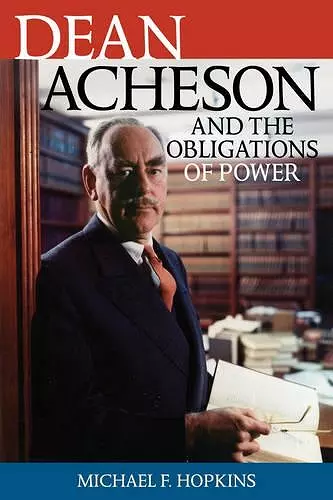Dean Acheson and the Obligations of Power
Format:Hardback
Publisher:Rowman & Littlefield
Published:17th Mar '17
Currently unavailable, and unfortunately no date known when it will be back

Dean Acheson was the most influential American diplomat of the twentieth century. He shaped the pivotal shift in American foreign policy from isolation to engagement in global affairs, This critical re-evaluation of Acheson’s public career analyzes his advocacy of intervention against Germany and Japan in 1939-1941, work on sanctions against Japan in 1941, contribution to the creation of new international institutions, and campaigns to secure the support of Congress and the American public. It scrutinizes his crucial role in the Truman Doctrine, the Marshall Plan, NATO, the formation of democratic governments in Germany and Japan, and involvement in the Korean War. It examines his advice on Europe and Vietnam to presidents Kennedy, Johnson and Nixon. Acheson was the architect of the policy of containing the Soviet Union that endured to the end of the Cold War. The book argues that Acheson was slower to abandon the prospect of understandings with the Soviets and the communists in China than his memoirs claim; his focus on the North Atlantic did not exclude his deep concern for Asian; and the policy of containment was part of his wider belief that American power brought the obligation to promote a stable international order.
Diplomatic histories are an acquired taste, but this admirable addition to the American Foreign Policy Series from Hopkins (The Cold War), senior lecturer in American foreign policy at the University of Liverpool, maintains the series’ high standard of scholarship while eschewing the traditional turgid academic prose. This is not a biography, so Hopkins dispenses with Acheson’s early years in a few pages. Appointed U.S. Assistant Secretary of State in 1941, Acheson (1893–1971) exuded energy, showed a sophisticated grasp of international affairs and economics, and possessed a gift for getting along with most of his fellow bureaucrats and members of Congress. Acheson resigned in 1945 but was persuaded to return as Undersecretary and then Secretary of State from 1948–1953, when he oversaw the rebuilding of Europe and Japan as well as America’s rise to superpower status. Despite persistent abuse by Joe McCarthy and the China Lobby for what they saw as insufficient opposition to communism, Acheson managed America’s aggressive containment policy, which persisted until the U.S.S.R.’s collapse. During a long retirement, Acheson advised and worked for Presidents Kennedy, Johnson, and Nixon, and his speeches and writing place him with Henry Kissinger among America’s leading 20th-century diplomats. [The book]...is gratifyingly well-written and provides a definitive account of mid-20th-century U.S. foreign policy. * Publishers Weekly *
"In a crowded field of Acheson studies, Michael Hopkins’ book stands out for its exploration of the entirety of this critically important figure’s ideology and ideas. Acheson may have been present at the creation of the Cold War order, but his thoughts ranged back well before that conflict developed. Hopkins has managed the rare feat of adding to a well-substantiated record with surprising insights, particularly on Asia and the supposed hardline approach to the Soviet Union." -- Thomas W. Zeiler, University of Colorado Boulder
“In this carefully researched and soundly argued study, Michael Hopkins uses an appropriately wide angle to ably trace Dean Acheson’s important role in the formulation of U.S. foreign policy from the outbreak of World War II through to the end of the Truman administration. In astutely examining the evolution of Acheson’s thinking, he sheds valuable light on the American assumption of global leadership during this decisive decade. He clarifies splendidly how Acheson understood well both his own personal obligations and those that his nation should fulfill.” -- Wilson D. Miscamble C.S.C., professor of History, University of Notre Dame
"Dean Acheson was one of the most influential figures in the last century of American politics and foreign policy. This book provides a revealing account of his ideas, his actions, and his legacies. Acheson’s global multilateralism helped to re-shape the world, and he remains a powerful model for contemporary policy-making. Anyone seriously interested in the past and future of American foreign policy should read this insightful and compelling book." -- Jeremy Suri, University of Texas at Austin
"Dean Acheson was one of the most consequential, if not the most consequential American diplomat of the 20th century. Michael Hopkins has written an incisive, well-researched, and complete study of Acheson’s career, both before and after his time as Secretary of State, demonstrating that Acheson should not be understood as an inveterate Anglophile or rigid Cold Warrior. He was in fact a statesman who thought deeply about America’s leading role and obligations in the world after 1945, and recognized the significance of history and historical perspective in crafting a strategy to cope with the new challenges the country faced. For those concerned with the obligations America still carries in the world of 2017 this book is required reading." Thomas A. Schwartz Vanderbilt University -- Thomas Schwartz, professor of History and Political Science, Vanderbilt University
''Paying welcome attention to the genesis of Acheson’s strategic vision, Hopkins has written an accessible biography of one of America’s most respected albeit controversial 20th century statesman. In an era when experience and expertise have become so undervalued, reading about Acheson’s lifetime of public service is highly instructive.'' -- Richard H. Immerman
ISBN: 9780742544918
Dimensions: 237mm x 157mm x 27mm
Weight: 594g
306 pages